#wwii china
Explore tagged Tumblr posts
Text
Full review from vox.com:
Hidden Blade / Wuming
Wang Yibo’s performance as Mr. Ye and the art created by the film’s director, Cheng Er
::-::-::-::-::-::
The shadowy puzzle-box pleasures of Chinese spy thriller Hidden Blade
Satisfyingly cerebral, Hidden Blade features a masterful Tony Leung and a breakout performance from Wang Yibo.
By: Aja Romano on February 28, 2023 7:30 am
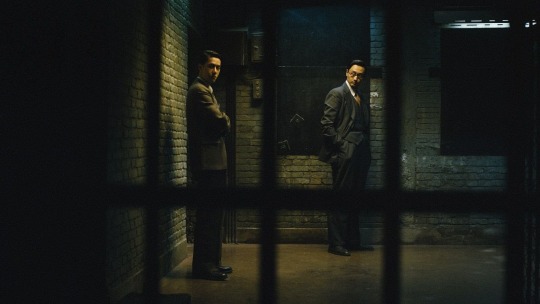
Wang Yibo and Eric Wang in Cheng Er’s moody, shadowy spy thriller Hidden Blade, now in cinemas. Well Go USA
Toward the end of Hidden Blade (无名), the arty Chinese World War II spy thriller that has now reached US cinemas, everything comes to a halt.
“Matte kudasai,” Wang Yibo, playing the canny, careful Secretary Ye, says in silky Japanese. Wait, please.
And then we all — the character he’s talking to, the camera, the film score, the audience, the movie — slow down and wait. We wait for him to light a cigarette, take a drag, then another. We wait for him to look at his reflection. We watch him, wreathed in smoke, take his time.
With a lesser actor, this would feel excessive, showy; it would flatten the moment. But this is Wang Yibo, star of The Untamed and Street Dance of China, former K-pop idol, sometime motorcycle racer, multitalented polymath, and multinational heartthrob. In the pause, tension and dark purpose coil in his jawline, his shoulders, in every flick of his wrist. I have never wanted to look at anything more in my life.
Hidden Blade has gone largely unnoticed in mainstream US media, usually getting name-checked as the legendary Tony Leung’s latest film. The New York Times gave it a kind but mixed capsule review. Other outlets that bothered to review it did so poorly, with multiple reviewers unable to tell cast members apart from one another (!), a handful misunderstanding and misstating the plot, one reviewer dismissing the entire cast apart from Leung. Several wrote it off as a propaganda film.
But Hidden Blade, from writer-director Cheng Er, deserves a much better critical assessment than this. It serves propaganda only in the way that the average war movie might glorify the homeland — think Top Gun: Maverick. In this case, that means a homeland battered by a brutal Japanese occupation. Our timeline centers around Republic-era China, several years after the Nanjing Massacre. The country’s combative factions — the Japanese occupants, the Kuomintang leadership, the current puppet government, and the underground communist resistance — all vie to control China’s future as the war wages around them. Our main characters, Director He (Leung) and his subordinate Secretary Ye (Wang), both work for the Japanese regime in Shanghai, rooting out members of each of the opposing factions and doing the governor’s bidding. But spies are everywhere, and their allegiances aren’t always obvious — sometimes not even to themselves.
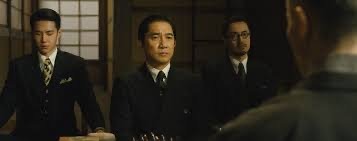
Hidden Blade’s production house, Bona Film Group, loosely placed this film into a “trilogy” called the China Victory Trilogy. (The prior film, The Battle at Lake Changjin (2021), was a mega-blockbuster; this film had a far more lowkey release, though it’s been such a success — closing on $1 billion RMB, it’s reportedly the top-grossing art film in Chinese history — that there’s talk of a sequel.) Each film, linked thematically but not materially, highlights a different group of ordinary people battling a war. This outing explores the pressures placed on WWII spies who often had to work in complete isolation for months and even years; the film’s Chinese title translates to Anonymous. Cheng takes the smoke-and-mirrors obfuscation of the spy genre literally: Ye spends much of the time he’s onscreen symbolically mirroring He, while studying himself in mirrors, being looked at through mirrors, and functioning as a looking-glass for the film itself.
This could all easily feel like shallow gloss with little substance, and the plot seems relatively thin; but over the course of the film, that plot reveals itself to be a tightly edited jigsaw awaiting your assembly.
This is a big part of why repeated viewings of Hidden Blade are such a pleasure (I saw it six times in four days). The film is a metaphorical escape room you find your way through, muddling at first, then quicker and quicker until you arrive at an open door. Cheng’s aesthetic style flickers through the muted action of the first half, from Godard-like formalism to von Trier-esque visual war poetry to outright Tarkovsky homages. But steadily the stylistic flourishes give way to a riveting, sparse thriller with phenomenal fight scenes, staged with excellent attention to setting and detail by fight choreographer Chao Chen. Cai Tao’s cinematography has lingered with me for days, with some shots cracking the whole film wide open for me on third or fourth watch.
This film basks in tiny thematic details — the timing of a musical cue, the symbolism of a tableau, the way a character’s face is lit between light and shadow. Then there’s the symbology; my friends have been discussing the thematic element of food in this movie for days: The symbolism of an intimidating bowl of drunken shrimp, the political nuances of debates over French cuisine, the secrets of an unassuming box of pastry.
In other words, Hidden Blade’s cerebral challenges invite you to play the games its characters are playing. It opens itself to the audience more and more with every repeat viewing. The supporting cast makes the most of limited emotional real estate; Eric Wang and Zhou Xun sink their teeth into their very different roles in the spy game. Tony Leung’s performance in particular grows craftier and more intelligent on every viewing as you begin to understand the veneer of polite soullessness around which he layers his real, veiled emotions. The moments he lets them peek through are masterful to behold.
But as much as Tony Leung was made for subtle but heady roles like this, Hidden Blade belongs to Wang Yibo, and so does this review.
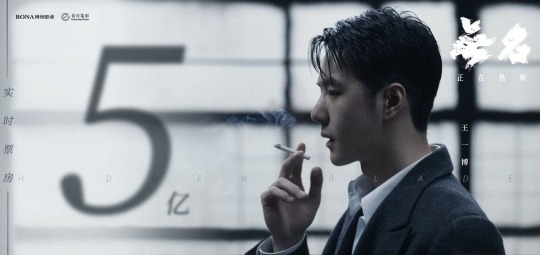
A production still of Hidden Blade featuring Wang Yibo, released for the film’s ¥500m box office. The film has since grossed nearly ¥1 billion. Bona Film Group
This is Yibo, after all, a 25-year-old wunderkind who spent his childhood training in Korea to become a K-pop idol but who returned to China and became a Chinese entertainer slash dance star slash actor instead. I first wrote about Yibo here in 2020 in my review of the historical fantasy series The Untamed. I described him then as “conveying Grand Canyons of emotional depth” through “mesmerizing infinitesimal facial adjustments.”
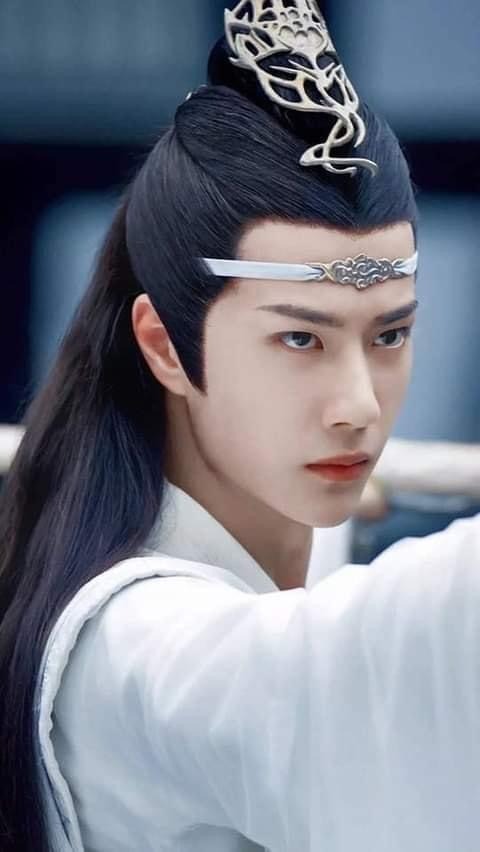
A screen cap of Wang Yibo as Lan Wangji from the global phenomenon, Chinese tv series, Chén Qíng Lìng / The Untamed (2019) Tencent (New Style Media Group)
Since then, I have watched Yibo disappear into one strikingly different character after another, embodying them all with talent and skill beyond his years; I have watched him deliver performance after performance, transforming himself onstage and off. He has a star quality that’s hard to describe until you truly get acquainted with his performances and his persona. On first impression, he’s rarely the hottest or the strongest or the glitziest entertainer in a room — but he’s the one who unfailingly blows you away in the end, the one you can’t stop talking about.
As Secretary Ye, Yibo packs the same intensity: He smolders and throbs and pulses his way through Hidden Blade, talking only rarely but speaking volumes with the soulful eyes that first captivated me and a jillion other fans three years ago.
Since The Untamed, Yibo has become a massive star in his home country. He was originally scheduled to make his film debut in the much more high-profile Born to Fly (now scheduled for a spring release), in which he stars as the equivalent to Tom Cruise in Top Gun. As much pressure as a role like that must be to play, the weight Yibo carries in Hidden Blade feels almost heavier. Cheng has talked at length about how the more he saw Yibo act, the bigger his part became; he rewrote the film around Yibo as production progressed, eventually transforming Ye from a smaller part into the soul of the movie.
That’s a huge responsibility, but Yibo shoulders it effortlessly. He immerses himself in Ye’s tortured psyche; he trembles and seethes and changes the mood of an entire scene with a single sharp glance. A debut like this, from an actor this young, in a part this intense, carrying the entire film beside one of China’s greatest living actors, all while juggling four different languages (Japanese, Mandarin, and Cantonese and Shanghainese dialects) feels remarkable. Yibo’s performance seals Hidden Blade’s status as an unexpected pleasure. Once finally assembled, its cinematic intricacies yield infinite rewards.
#sourced: vox.com#wang yibo#hidden blade movie#film review#no spoilers#wu ming anonymous#wwii china#period drama#tony leung#director: cheng er#cinematography#living art#take my money#ive watched it twice so far
31 notes
·
View notes
Text

P-40 Warhawks of the Flying Tigers' 3rd Squadron, Hell's Angels, over China, photographed in 1942.
267 notes
·
View notes
Text
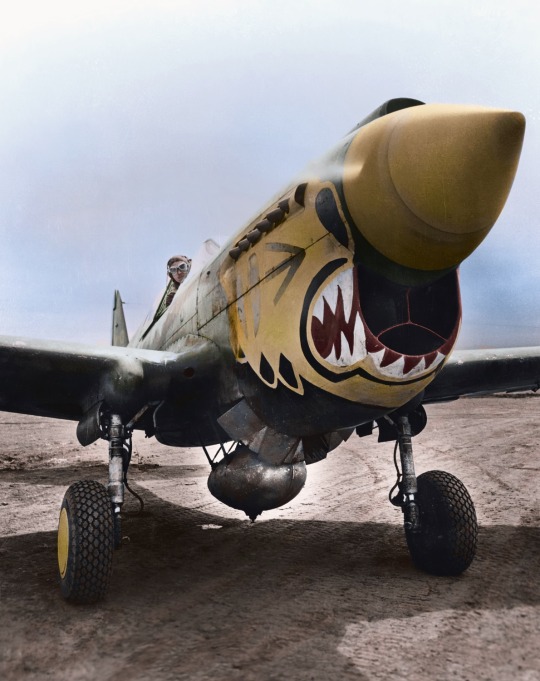
USAAF P-40 Warhawk of the 11th Fighter Squadron, 343rd Fighter Group in Alaska, 1943
➤➤ P-40 - The Flying Tigers Story VIDEO: https://dronescapes.video/FlyingTigers
#youtube#aircraft#airplane#aviation#dronescapes#military#documentary#ww2#wwii#aviation history#Histo#history#p 40 warhawk#Warhawk#China
411 notes
·
View notes
Text
Chinese Flower Boats
Flower boats had already existed for centuries, perhaps since the 14th century, but earlier is also possible. They were initially only available to the noble elite. They were luxury brothels with noble courtesans on board and they resembled luxurious pleasure boats with a sun deck with a private chamber and a pavilion at the stern. Not much can be said about the early designs and appearance, as records only began around 1700.
At this time the boats began to change, the stern became more and more drawn upwards so that it looked very much like a beak. There was a special reason for this, but more about that in a moment.
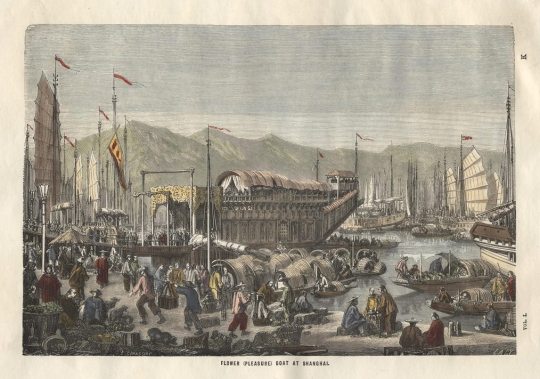
Flower Boat at Shanghai" wood engraved print with recent hand colour, published in All Around the World, about 1880 (x)
From then on, the boats were available in different sizes and even in different price categories. There were small ones with only one or two girls, or large ones with up to 10 or more, all of different ages, even little girls were included, although they were still learning until they were 12 before they received their first customers. Moste of these women were no longer noble courtesans but rather women from poor families who were sold to the ship owners. With the emergence of the European trading companies, they also got access to the flower boats, albeit illegally, but this could be regulated with a small bribe to the officials. Unfortunately, these meetings also further encouraged the exchange of exotic sexually transmitted diseases.
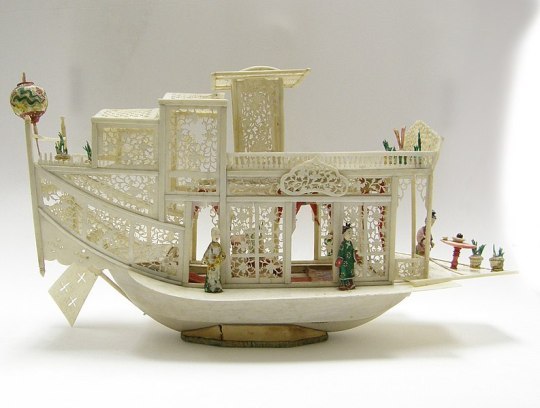
Ivory Flower boat model, late 18th century (x)
What was to be expected on such boats depended on the price of the respective ladies, with the high-priced ladies there was already entertainment and culture included, the middle price ranges offered some additional types of games and the cheap ones were, and I'm sorry to say this, for the quick number.
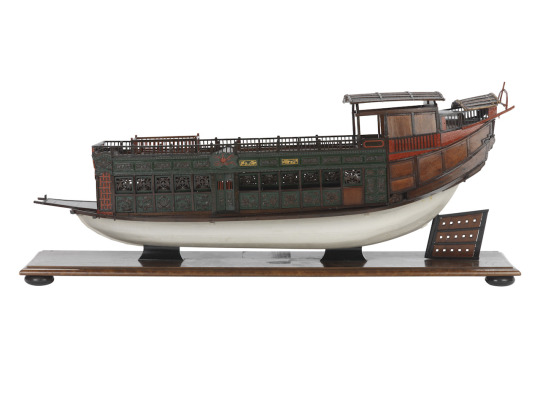
A model from the late or early 20th century (x)
These boats were to be found at all harbours and rivers, there were even whole streets of them. But let's move on to the very high stern, which from the 18th century onwards could take on very bizarre proportions. The ships did not always stay in the harbour to save space and prevent epidemics. The ships were be towed or sailed by their own, up and down the rivers and because they were so high at the stern they started to bob faster, which was supposed to increase the fun of the customers even more.

A Canton Flower Boat on the Pearl River, late 19th century (x)
Surprisingly, they continued to exist into WWII, although from the 19th century onwards these trips became increasingly rare and then ceased altogether. And many boats were also abandoned and became floating restaurants.
64 notes
·
View notes
Text

Japanese soldiers on the march as they advance to Hong Kong - Dec 1941
#world war two#ww2#worldwar2photos#history#1940s#ww2 history#wwii#world war 2#ww2history#wwii era#hong kong#1941#China#war in the pacific#pacific war#pacifc#Japanese
53 notes
·
View notes
Text

The Imperial Japanese Navy (IJN) Special Naval Landing Forces troops in gas masks prepare for an advance in the rubble of Shanghai, August 1937, China.
#second sino japanese war#sino japanese war#1930s#war history#wwii#ww2#world war 2#second world war#world war two#world war ii#Second Sino-Japanese War#ww2 history#wwii era#ww2 era#1940s#military history#china#shoting#heavy machine gun#japanese#japanese army#tumbler#photography#history
58 notes
·
View notes
Text

Lin Wang (林旺) was an Asian elephant who served the Republic of China's Army during the Chinese-Japanese War (1937 -1945).
He lived the rest of his life in the Taipei Zoo in Taiwan where he was affectionately referred to as "grandfather" by children. He died at the age 86 in 2003. Tens of thousands of people attended his memorial service.
30 notes
·
View notes
Text

Troupes japonaises dans la banlieue de Hankou – Bataille de Wuhan – Guerre sino-japonaise – Wuhan – Hubei – Chine – Fin octobre 1938
#WWII#guerre sino-japaonaise#sino-japanese war#seconde guerre sino-japonaise#second sino-japanese war#bataille de wuhan#battle of wuhan#armée impériale japonaise#imperial japanese army#ija#hankou#wuhan#hubei#chine#china#10/1938#1938
31 notes
·
View notes
Note
It's almost father's day what did Chenguang and Mei prepare for Red Son
Chenguang hears about Father's Day thanks to some tourists and one of her daycare classmates having a US father.
When Red Son picks her up that day, Chenguang is in a panic, blurting out that they have to give him presents and she almost forgot to. He has to explain to her that she doesn't have to do that, and that it's okay, they don't really do Father's Day. And besides which, she honors him every day, just being herself and existing.
Which does make her happy, but she still goes to Mei later and asks if they can still do something for him.
Mei and Chenguang end up working together to make dinner (calling Pigsy and MK to help) and Chenguang draws him a picture.
#monkie kid#lmk fankid#chenguang#dragonfruitshipping#did some research and discovered that while Mother's Day is a thing in mainland China; Father's Day is not#apparently China did briefly celebrate Father's Day during WWII era but it was mostly used to celebrate fathers in war#but after the war was over the attention to it dropped out#according to this research most people who celebrate Father's Day in mainland China are expats or mixed families#bring it up to someone else and they'll be like 'what.'
15 notes
·
View notes
Text


In the US, you never learn about this in school.
12 notes
·
View notes
Text
There are deep problems with the outcome of WWII. Most disturbingly, the war ends with the Josef Stalin and the Soviets in control of half of Europe and dominant in Asia.
Yet the narrative is that WWII was fought to end tyranny.
In the Atlantic Charter FDR stated that one of the core aims of Allied intervention was to establish "a peace which will afford to all nations the means of dwelling in safety within their own boundaries, and which will afford assurance that all the men in all lands may live out their lives in freedom from fear and want."
But that isn't what happened. Instead, WWII ended with a brutal dictator in control of vast swaths of new territory. WWII did not end aggression or tyranny. If anything, the conflict ended with even more human beings worldwide under totalitarian domination.
Was WWII fought to free Poland? If so, it was a failure. Poland remained under Soviet control for another 40+ years.
Was WWII fought to free China from aggression and genocidal? If so, it was a failure. The communists immediately seized control and brutally murdered and starved tens of millions.
I have been told that Germany invading Poland in September of 1939 was a terrible international crime. Yet, the USSR also invaded Poland in September of 1939, seizing more territory than the Nazis! The communists also immediately killed nearly 10x the number of Polish civilians during the period between 1939-1941.
Yet, at Nuremberg Soviet judges sat in judgment over their former Nazi allies! How can we call this justice?
What a farce.
Claims that the holocaust justified American intevention are also flawed. For one, no Allied leader made alleviating the plight of the Jews a central cause of going to war. Not one! Jewish suffering was not important to FDR. It certainly was not important to Josef Stalin. Historical honesty means we need to understand the Allied leaders as they understood themselves.
We must also confront the way in which the war was fought.
Every major allied combatant targeted civilians for destruction and employed concentration camps. This raises a question: if murdering civilians in death camps is evil then how can we justify killing them with high explosives and nuclear weapons?
If the Nazis rounding up and imprisoning Jews was wrong then why was FDR rounding up and imprisoning Japanese justified?
Is murdering civilians always evil or is it only evil when the bad guys do it?
I have never seen defenders of the mainstream narrative provide a satisfactory answer. In the end, the chief defenders of the mainstream narrative revert to arguing that the Allies had "no choice."
We had to give $300 billion in aid to Stalin. We had to let him take over half of Europe and virutally all of the Far East. We had to help Mao come to power. We had to firebomb all those women and children. We had to nuke those Japanese.
We had no choice.
In the end, I find this argument childlike and weak. A serious thinker considers alternatives.
Even more disturbing, virtually every defense of Allied conduct in WWII ultimately becomes a defense of communism and the Soviet Union.
It is clear that we desperately need to take a fresh look at the most important conflict of the modern world.


I find this destruction impossible to justify. The annihilation of the heart of European and Japanese civilization is hard to stomach. We must confront these acts, committed in the name of "freedom" and "democracy," earnestly and seriously.




Our ally, Josef Stalin, did this. Is intentionally killing civilians a moral evil or is it only evil when the Nazis do it?

The man on the right was an ally of Adolf Hitler and a brutal tyrant. Yet here he is being honored by FDR.

The US relationship with the USSR wasn't just an alliance of convenience, either. The US made Soviet propaganda as part of the war effort.
youtube

#RETHINKING WWII#Hitler and Stalin#Russia and Germany#Japan and China#Murderous Leftists vs Murderous Right#Socialism and Communist Poison#USSR and FDR#Twitter Thread by Joseph Lippincott#Youtube
7 notes
·
View notes
Text
Rewatching the 90s live action Teenage Mutant Ninja Turtles movie, a nice little touch is that they go out of their way to establish that the evil ninjas are not Japanese (except the Shredder) and that the Japanese-American community has actually been warning the authorities about the evil Foot Clan.
I don't know how many people remember this, but in the 80s/90s in America there was a lot of anxiety / prejudice towards Japan, which was perceived as this mysterious place full of workers who were "too" efficient compared to lazy Americans and thus were going to crush the American car industry or something.
Specifically, I remember an American car dealer (as in he sold American car brands like Fords or Chevys) who ran a local ad urging people to "buy American" instead of supporting "communist Japan."
Shoutout to the journalist back then who covered the story / called him out on his prejudice + pointed out that Japan was not a communist country. No matter the era, there were / are people pushing back against stupidity and bigotry. And you can be one of them. :)
Anyway, TMNT is a great movie.
#TMNT#Japan#anti asian prejudice#iirc right after WWII Japan was perceived by the west as a place where junk was manufactured#like cheap trinkets that these days come from China#and electronics that fell apart after one use#but then that shifted and Japan began to export high quality goods#and this happened as manufacturing was basically dying in America#so it was racism + this perception that America was falling behind
62 notes
·
View notes
Text

A P-40 Warhawk, part of the famous Flying Tigers, sits near a runway in China while a C-46 Commando lands in the background.
165 notes
·
View notes
Text

R.T. Smith shows details of the Flying Tiger's P-40 Warhawk iconic emblem, produced by the Walt Disney Company. Kunming, China, 23 May 1942.
➤FLYING TIGERS DOCUMENTARY:
#P-40 Warhawk#china#WW2 China#p 40 warhawk#R.T. Smith#R T Smith#Flying Tigers#WW2 Flying Tigers#youtube#aircraft#airplane#aviation#dronescapes#documentary#military#aviation history#ww2#wwii
10 notes
·
View notes
Text

“P-51! Cadillac of the sky!”
Empire Of The Sun (1987)
#1987#film#movie#aviation#WWII#Empire Of The Sun#Steven Spielberg#Christian Bale#James Graham#Jim#Nigel Havers#Dr. Rawlins#John Malkovich#Basie#Sino-Japanese War#Japanese Empire#China#P-51D#Mustang
7 notes
·
View notes
Text
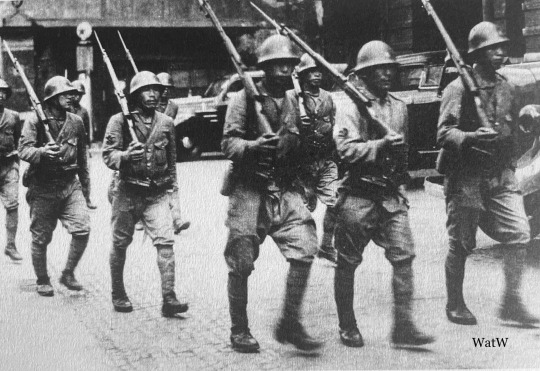
Japanese troops enter the City of Shanghai - 1937
#world war two#1940s#worldwar2photos#history#ww2#wwii#ww2 history#wwii era#world war 2#ww2history#shanghai#China#1937#sino japanese war#japanese army
62 notes
·
View notes